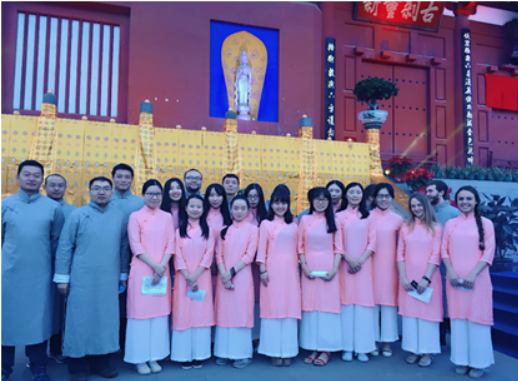|
Two
IEAS students Miss Zhang Xuyi
and Miss Xiong Cheng, together with students from Tsinghua University, Peking University,
Columbia University, Fudan University, London University, University of Chicago
and the Chinese University of Hong Kong, attended a 10-day international summer seminars
on Buddhism and East Asian culture held at Da Sheng Zhu Lin Si (Õż¦Ķü¢ń½╣µ×ŚÕ»║) in Mountain Wutai (õ║öÕÅ░Õ▒▒)from 15 to
25 July 2016, through which two IEAS studentsŌĆÖ religious knowledge met practice. As a
religion of wisdom, Buddhism taught IEAS students to appreciate the wisdom and
unfixed basics of the self in the changing world. IEAS students took this
unique opportunity to pursue academic study of Buddhism within a religious
environment for practice. The seminars invited a famous group of Buddhist
scholars to present their own perspectives of Buddhism in English in addition
to provision of guidance to international students in Buddhist practice by
Chinese monks.
This international Buddhist seminar is usually held
annually and serves as the premier international forum for international students
and scholars of Buddhism to present their latest research findings. Inaugurating the international Buddhist seminar, Dr James Robson (ńŠģµ¤ÅµØŠ), Professor of East Asian Languages
and Civilizations and Director of Graduate Studies for the Regional Studies
East Asia M.A. Program of Harvard University, explored the commonalities of
religions in the perspective of Western philosophy. He enlightened
all international students on the interface between
Buddhism and other humanistic and scientific disciplines in both the East and
the West as an intellectual, as well as religious, current in all
civilizations.
In
Dr Jinhua ChenŌĆÖs(ķÖ│ķćæĶÅ»),
Wall Scholar and Professor of East Asian Buddhism of the University of British
Columbia, seminar of ŌĆ£International Characteristics of Buddhism: East Asian
PerspectivesŌĆØ’╝īhe
shed light on the principle of nonviolence as
the core of Buddhist tradition internationally. In contradistinction to some
purportedly more ŌĆ£violentŌĆØ international religions, Professor Chen asserted
that Buddhism has had no institutional involvement in conflicts in different
East Asia perspectives.
Dr Barend J. ter Haar (ńö░µĄĘ), Shaw Professor of Chinese of
the University of Oxford, presented a seminar on ŌĆ£Enlisting
the Divine Realm: Witches, Mediums, Shamans and Buddhist CritiqueŌĆØ. He
concisely discussed the gist of his extensive study of a
religious movement commonly known as the Non-Action Teachings (wuweijiao ńäĪńé║µĢÖ) and argued that the
movement was a special and innovative form of lay Buddhist practice which was
different from the traditional historiographical depictions of the movement as
rebellious or deviant, and should not be studied with a messianic orientation.
A special feature of this international seminar is international students
paying homage to the Buddha at the temple. They chatted with monks, prayed,
mediated and had vegetarian meals. With experience in a variety of existing
Buddhist rituals and devotional practices in addition to the seminars of world
class scholars, two IEAS students had a valuable journey of academic and
religious enlightenment.

|
